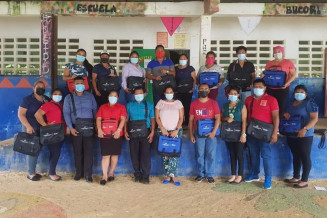In the middle of a jungle in Panama, you might come across an indigenous community’s rural village. Although indigenous communities greatly vary across Panama, what is immediately noticeable is their shared respect for nature and the environment. Indigenous communities in Panama play a significant role in sustaining the diversity of the cultural and biological landscape. Nonetheless, they are still confronted by societal marginalization, poverty, and inadequate resources and access to education. The COVID-19 pandemic exacerbated these existing challenges, particularly due to the closing of schools, affecting students, teachers, and local communities.
Due to deeply rooted socio-cultural norms and practices that have become institutionalized in society and the educational system, indigenous learners have limited opportunities to access, remain in, and complete their education. The lockdown and quarantine made going to school impossible for both students and teachers.
However, despite the challenges of the pandemic, considering that “all students should continue learning,” the educational community, from teachers to the Ministry of Education, mobilized to ensure that children could continue to learn remotely and go back to school as soon as possible.

Ensuring learning never stops
While many indigenous households do not have access to digital devices, teachers from local schools, parents, and children adopted a whole-school approach and committed to finding innovative solutions. For instance, the Bucori Educational Center, located in the district of Kasupin, reached out to the Parents’ Association to develop study materials that would allow children to learn remotely and maintain contact with their teachers. Each teacher contributed by building and printing modules for their students. In May 2022, following the safety measures set in place by the Ministry of Education and Ministry of Health, children were able to return to school in a hybrid manner.
Moreover, the community’s mobilization presented the Bucori Educational Center and its teachers and staff with the opportunity to participate in the “Workshop for Trainers on Education for Sustainable Development (ESD)”.
Getting learners climate ready
ESD seeks to provide learners of all ages with the knowledge, skills, values, and attitudes to address interconnected global challenges such as climate change, biodiversity loss, unsustainable resource use and socio-economic inequalities. The workshops helped the education center acquire the know-how to promote different programs and activities around sustainable development and climate change.


Meanwhile, in the district of Capira, the educational community of Las Gaitas school was also activated by the global health crisis and sought to ensure pedagogical continuity for its 45 students. Close links between teachers, parents, and students were maintained. Parents were encouraged to remain involved inside and outside the classroom as their support was essential during the pandemic to help students feel more secure and confident.
The pandemic was also an opportunity for Las Gaitas school to integrate ESD into the community’s adaptation strategy. By efficiently managing funds allocated by the Ministry of Education of Panama, coordinating support received from community benefactors, as well as collaborating with parents to cultivate a school garden, the school ensured that there was never a shortage of food in the canteen. Students received a daily plate of nutritious food that directly correlated to their higher performance in class.
Through ESD workshops organized by UNESCO Cluster Office in San José, schoolteachers and staff acquired new experiences and knowledge to implement programs and projects on sustainable development, as well as share experiences amongst each other. Participants gained a new perspective on how to improve curricula, pedagogy, and infrastructure to provide quality education to their learners.
The COVID-19 pandemic tested the ability of teachers, students, and local communities worldwide to adapt to such an unprecedented crisis. However, as these two schools in Panama have demonstrated, solidarity and commitment from the local community have the power to carry on transformative learning opportunities and foster a more sustainable and equitable society and planet.
- UNESCO’s work in Education for Sustainable Development
- Interested in collaborating with Bucori Educational Center or Las Gaitas School? Contact san-jose@unesco.org








